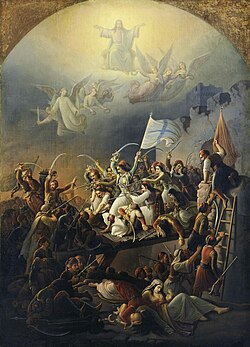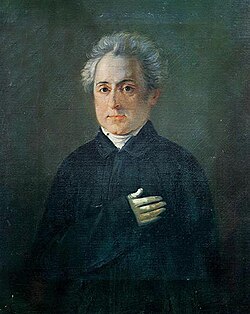The Free Besieged



The Free Besieged (Eleftheroi Poliorkimenoi) is a poetic work by the renowned Greek poet Dionysios Solomos, who is also known for writing the Hymn to Liberty, the national anthem of Greece and Cyprus. This work, though not as widely recognized as the Hymn to Liberty, holds a significant place in Greek literature and history, reflecting the spirit of the Greek War of Independence against Ottoman rule in the early 19th century.
Overview[edit]
The Free Besieged is considered an epic poem, albeit an unfinished one, that Solomos worked on for many years. The poem is inspired by the heroic defense of Mesolongi during the third siege by Ottoman forces in 1825-1826, a pivotal event in the Greek War of Independence. The siege ended tragically with the mass exodus and subsequent slaughter of its defenders and civilians, an event that deeply moved Solomos and influenced much of his later work.
The poem is not a historical account but rather a philosophical and existential exploration of freedom, sacrifice, and the human spirit under siege. It delves into the collective and individual psyche of the besieged, their moral dilemmas, and their unwavering commitment to the idea of freedom, even in the face of certain death.
Composition and Structure[edit]
The work is fragmented, consisting of various drafts, notes, and poems that Solomos left incomplete at his death in 1857. Scholars have attempted to piece together these fragments to form a coherent work, but the poem remains an enigmatic masterpiece, open to interpretation and analysis.
The poem's structure is unconventional, with no strict narrative flow. Instead, it comprises lyrical passages, dialogues, dramatic monologues, and philosophical reflections. This fragmented structure reflects the tumultuous and unfinished nature of the Greek struggle for independence, as well as Solomos's own struggles with the artistic representation of such profound themes.
Themes and Interpretations[edit]
At its core, The Free Besieged explores the concept of freedom and the human capacity for self-sacrifice and endurance in the face of overwhelming adversity. The poem also touches on themes of national identity, collective memory, and the transcendental nature of the struggle for liberation.
Interpretations of the work vary, with some scholars viewing it as a testament to the indomitable spirit of the Greek people, while others see it as a broader commentary on the human condition and the eternal quest for freedom and dignity.
Legacy[edit]
Despite its incomplete state, The Free Besieged is celebrated as one of the masterpieces of Greek literature and a monument to the spirit of the Greek War of Independence. It has inspired generations of Greeks and others around the world with its universal themes and its profound emotional and philosophical depth.
The work is studied in Greek schools and has been the subject of numerous literary and scholarly analyses. It stands as a testament to Dionysios Solomos's genius and his contribution to the literary and cultural heritage of Greece.

This article is a literature-related stub. You can help WikiMD by expanding it!
Ad. Transform your life with W8MD's Budget GLP-1 injections from $75


W8MD offers a medical weight loss program to lose weight in Philadelphia. Our physician-supervised medical weight loss provides:
- Weight loss injections in NYC (generic and brand names):
- Zepbound / Mounjaro, Wegovy / Ozempic, Saxenda
- Most insurances accepted or discounted self-pay rates. We will obtain insurance prior authorizations if needed.
- Generic GLP1 weight loss injections from $75 for the starting dose.
- Also offer prescription weight loss medications including Phentermine, Qsymia, Diethylpropion, Contrave etc.
NYC weight loss doctor appointmentsNYC weight loss doctor appointments
Start your NYC weight loss journey today at our NYC medical weight loss and Philadelphia medical weight loss clinics.
- Call 718-946-5500 to lose weight in NYC or for medical weight loss in Philadelphia 215-676-2334.
- Tags:NYC medical weight loss, Philadelphia lose weight Zepbound NYC, Budget GLP1 weight loss injections, Wegovy Philadelphia, Wegovy NYC, Philadelphia medical weight loss, Brookly weight loss and Wegovy NYC
|
WikiMD's Wellness Encyclopedia |
| Let Food Be Thy Medicine Medicine Thy Food - Hippocrates |
Medical Disclaimer: WikiMD is not a substitute for professional medical advice. The information on WikiMD is provided as an information resource only, may be incorrect, outdated or misleading, and is not to be used or relied on for any diagnostic or treatment purposes. Please consult your health care provider before making any healthcare decisions or for guidance about a specific medical condition. WikiMD expressly disclaims responsibility, and shall have no liability, for any damages, loss, injury, or liability whatsoever suffered as a result of your reliance on the information contained in this site. By visiting this site you agree to the foregoing terms and conditions, which may from time to time be changed or supplemented by WikiMD. If you do not agree to the foregoing terms and conditions, you should not enter or use this site. See full disclaimer.
Credits:Most images are courtesy of Wikimedia commons, and templates, categories Wikipedia, licensed under CC BY SA or similar.
Translate this page: - East Asian
中文,
日本,
한국어,
South Asian
हिन्दी,
தமிழ்,
తెలుగు,
Urdu,
ಕನ್ನಡ,
Southeast Asian
Indonesian,
Vietnamese,
Thai,
မြန်မာဘာသာ,
বাংলা
European
español,
Deutsch,
français,
Greek,
português do Brasil,
polski,
română,
русский,
Nederlands,
norsk,
svenska,
suomi,
Italian
Middle Eastern & African
عربى,
Turkish,
Persian,
Hebrew,
Afrikaans,
isiZulu,
Kiswahili,
Other
Bulgarian,
Hungarian,
Czech,
Swedish,
മലയാളം,
मराठी,
ਪੰਜਾਬੀ,
ગુજરાતી,
Portuguese,
Ukrainian